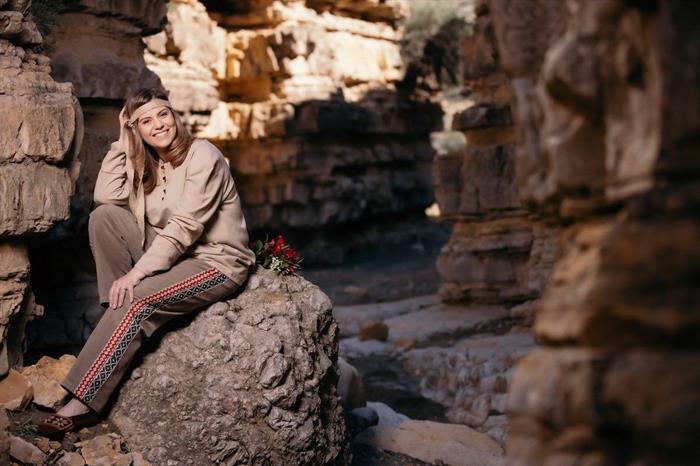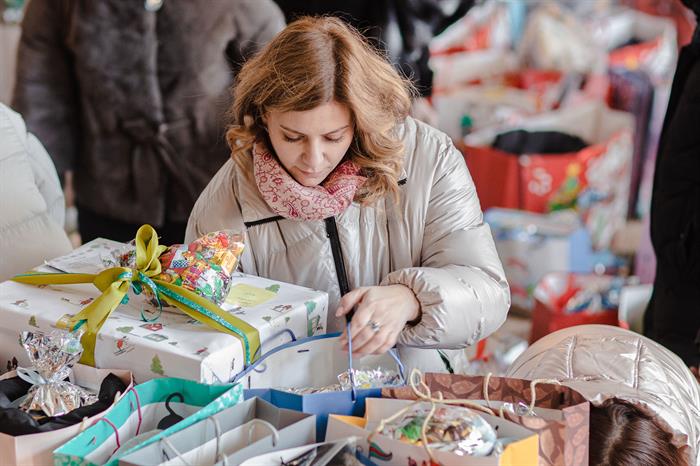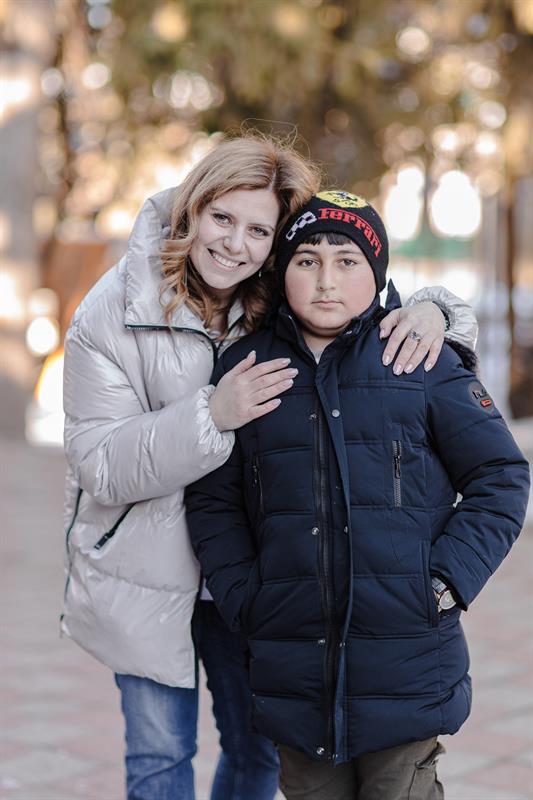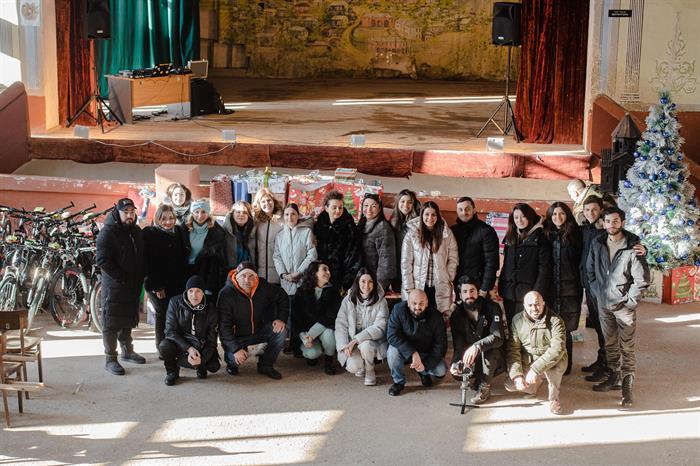My Impact
14.02.2022
7 min read
Impact Maker
Elena Akopyan: Helping the Children of Armenia
-webp(85)-o(jpg).webp?token=e49b573b7ce80d2f942fe02b31e58ca7)
Repat Armenia Foundation spoke with Elena Akopyan, a sales manager from Moscow and President of the "Hurry to Good" Foundation, which has been doing good deeds to help children in Armenia for more than 10 years.
Elena, tell us a little about yourself, your childhood, and your move to Russia.
- I was born in Yerevan and my roots are from there. We moved to Moscow in 1998 when I was 10 years old. My parents, like many at that time, wanted their children to get a good education and live in favorable conditions because in Armenia they could not give us that. Here, in Moscow, my sister and I went to school and got higher education. I am a marketer by education, I graduated from the Moscow State University of Instrument Engineering and Informatics, but I did not work as a marketer for a single day. From my first year to this day, I have worked in sales.
In general, you could say that my entire conscious life has been spent in Moscow. Unfortunately. Maybe fortunately in terms of the skills I have learned, friends, acquaintances, and environment. However, my soul lives in Armenia, and every second I think about Armenia and how to make it better.

How have you kept in touch with Armenia over the years?
- My parents tried very hard to do their best to get us to Armenia at least once a year. For a couple of weeks or a month in the summer, they would send us to the homeland. My sister and I always looked forward to the summer when we could go there. But it was not more than once a year.
Were you an active member of the Armenian community? If yes, what did you do?
- I studied in an Armenian school, so I was lucky that I was always surrounded by Armenians, my friends and acquaintances were all Armenians. I had Russian acquaintances and friends at university, but I could not get close to them in the same way as I did with my compatriots. We had an Armenian party at the university. I went to church every Sunday. In general, I was always in an Armenian environment.
I was always an activist, I liked to organize different events for the community. It was my way of life. I didn't even realize it then and I only realized it now after your question.
Tell us how and when you joined the work of the "Hurry to Good" Foundation? Who or what inspired you to take this step?
- I started doing charity work consciously in 2007 when I heard about the story of an Armenian girl who ended up in an orphanage here in Moscow. This story was wild for me, so I decided to check it out and go to see her. We spent a lot of time with her, we were together for about 4 years. I was looking for a new family for her, doing everything I could to make sure she didn't end up in an orphanage or a home for the disabled.
I came to the "Hurry to Good" Foundation, namely to the volunteer movement "Let's Help the Children of Armenia" in 2015 when I was already fully engaged in various cases of children from Armenia. I came to the Foundation with one of my stories and asked for help. Karina Davtyan, the President of the Foundation, and an ophthalmologist, said that she had been waiting for me and realized that I could be trusted with everything that had been created. So I became the President of the Foundation and continue our mission to this day.

"Become Santa" project in the village of Artsvaberd
What difficulties did you face at the beginning of your journey? Was it easy to gather like-minded people around you?
- One difficulty has always been the constant turnover of volunteers, who come at some point but can leave because of personal matters and work. We have urgent cases and we need to have a human resource at all times. But since this is volunteering, I can't ask or force to do something here and now because I know that the person has their own work and things to do. So you have to always be in a waiting mode until someone has that opportunity to help with this or that. But, of course, it's nice to have one person to deal with a particular issue all the time. But again, this is more of a feature than a difficulty. Over such a long period of time, we have formed a huge circle of volunteers and friends of the foundation.
We gathered our like-minded people and volunteers through social networks, and before the pandemic, we organized many events. These were Armenian concerts, master classes, and exhibitions, thanks to which we gathered the Diaspora around us and could also do fundraising.
Tell us more about the activities and directions of your foundation. Are you planning to launch new projects this year?
- First of all, it is assistance to seriously ill children - organization of medical care and full support. This is not only payment of medical expenses, but also organization of flights, accommodation, negotiations with doctors, accompanying the child up to discharge and return flight home. Also, several times a year we visit poor families and distribute humanitarian aid.
This year we left two projects. The first project is "Become Santa", when children from border villages write their wishes to Father Christmas without their parents' involvement, and their dreams come true. We were able to reach more than 700 children. The second project is preparing underprivileged children for school.

Elena and Erik from the village of Artsvaberd. Eric asked Santa to send the amount of his gift to the Defender of the Fatherland Rehabilitation Centre
Also this year we are planning to launch a new direction - an educational project in border villages for preschool children. We want to help children to be more independent and to be able to make decisions, defend their opinions, and make some projects by training teachers in the right approaches and methods of education.
What organizations does the foundation cooperate with? Who are the most successful partners?
- The Armenian partner is Armen Martirosyan, who is the director of the Armenian Children's Health Foundation. We cooperate very closely. This is one of the few foundations, one can even say a single one, which helps sick children. They do it systematically, competently, and correctly. We always help each other. I am here in Russia, in the field of medicine. And if I need help in Armenia, Armen is always ready. We are in touch almost every day. We are also in touch with "Հայ Մայրեր", "Կյանքի Ճանապարհ" and "City of Smile" foundations.
In Russia, these foundations are Life as a Miracle, Club of Do-gooders, Pravmir, Dr. Lisa, and Russian Humanitarian Mission. Unfortunately, there are few foundations in Russia that are ready to help Armenian citizens, because the statutes do not allow them to do so, or there are some internal regulations.
We cannot but touch upon the topic of war. I know that the Foundation has done a tremendous job in helping the families of displaced people. Tell us a little more about this difficult period for everyone.
- It so happened that I was in Armenia at that time. We were able to set up a call center, a headquarters, and a huge warehouse in a matter of days. We had different groups working for us. One group was responsible for accommodation, the second for relocation, the third for food, the fourth for medical care, and the fifth for the delivery of all this. All of this work was done with the help of volunteers. During this period there were just over 300 volunteers working almost around the clock - 250 in Moscow and 150 in Armenia. Approximately 40,000 people received our help during the war. We traveled to different villages, received calls, we had a large base. We have a huge warehouse in Moscow and still have a warehouse in Armenia. Every week we sent cargo both by lorries and by the Ministry of Emergency Situations aeroplanes. With the "Dr. Lisa" foundation we came and provided medical assistance on the ground in the villages where the displaced people were accommodated.
A lot of people from Russia and Armenia become your volunteers. Can you tell us how one can become a volunteer at your foundation?
- We have had many stories of people becoming volunteers, quitting their jobs, and moving to Armenia to help in the field. There were also those who simply ran away from home and without informing anyone flew to Armenia during the war to help and then informed their families. You can't help but admire that.
Becoming our volunteer is very easy. One can write to us on Instagram. The most important thing is that a person must be willing to donate their time. We spend a lot of time, we have a lot of work and events this year. The most important thing is to have a great desire to help and be on the same team. And also to be able to love. To love unconditionally. Because if a person is not like that, we will not be able to work with him (laughs).

Volunteers and friends of the foundation at the "Become Santa" project in the village of Artsvaberd
I know that the foundation is now in need of a permanent administrative resource and needs funding for this. Could you tell us a little bit more about that?
- Yes, we want systemic changes, we want to scale our work. We get a lot of requests and we can't stay up all the time at night. There is not enough time to process it all. We need administrative resources and funding. I can't ask a volunteer to quit his/her job, I will have to provide him/her with a salary. We would be very grateful if someone could help us with this issue directly or put us in touch with relevant people or organizations.
* Here you can support the foundation financially: https://taplink.cc/speshikdobru.
Have you thought about repatriation to Armenia? Do you plan to return to Armenia permanently someday?
- I have been thinking about it for a long time. A year and a half or two years ago I started to think about moving more seriously. I never lose hope that I will return. But in order to return to Armenia, I really want to change or at least slightly improve two things: medicine and education. These are two important components, considering that I have children. I don't worry so much about employment. I will probably be living in two countries. It is important for me that I provide all possible assistance to Armenia to the maximum. Now I am probably useful to Armenia being here in Moscow.
What would be your message to Diaspora Armenians today?
- I would like people to start loving each other unconditionally. All relationships and interrelations and everything depend on it. We should always move from words to considered actions and direct them to help. Not to envy, not to compete, but simply to love. Then we can change a lot of things.
Marianna Chobanyan
-
Repat Story
-webp(85)-o(jpg).webp?token=be2e2e1cd8ed9e2310c410e3244b92c3) 31.01.20257 min readThe Repatriate Behind Armenia's First and Only Triathlon Club
31.01.20257 min readThe Repatriate Behind Armenia's First and Only Triathlon Club -
Repat Story
-webp(85)-o(jpg).webp?token=99b4e91bb8cc1967465c3f6b761a71cc) 26.08.20248 min readThe Revival of Sailing in Armenia: The Story of Artashes Dadyan
26.08.20248 min readThe Revival of Sailing in Armenia: The Story of Artashes Dadyan

-webp(85)-o(jpg).webp?token=a916bd5793380ff08f870863f3dcaa32)
-webp(85)-o(jpg).webp?token=36be019b5372dc162cce9687b13d187a)